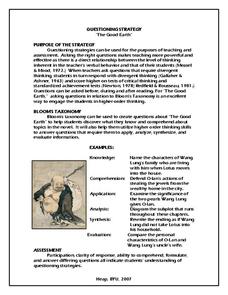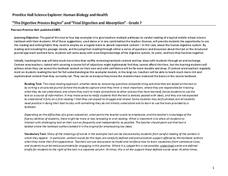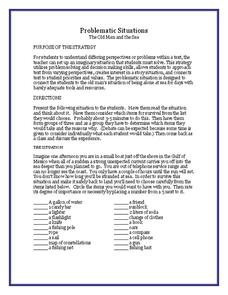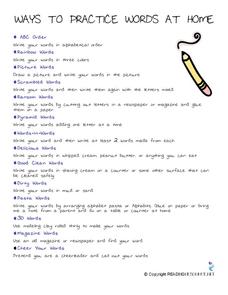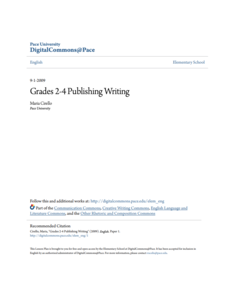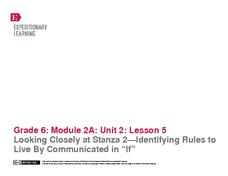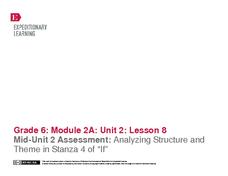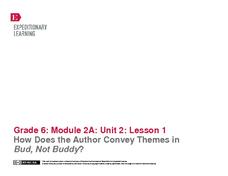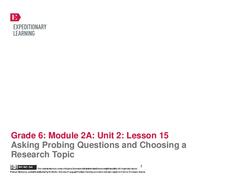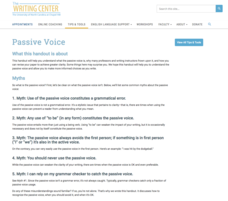Novelinks
The Good Earth: Questioning Strategy
Readers use Bloom's Taxonomy to create multi-level questions about Pearl Buck's The Good Earth.
Curated OER
Unwind: Discussion Strategy, Chalk Talk
Readers of Neal Shusterman's young adult science fiction novel, Unwind, engage in a silent discussion, posting their responses to a series of statements about characters in the story.
Savvas Learning
"The Digestive Process Begins" and "Final Digestion and Absorption"
Want your class to digest text more thoroughly? Middle schoolers learn about the digestive system in the lesson and reinforce informational text reading skills through a variety of strategies. They engage in a close reading approach,...
Learning A-Z
Tips for Teaching: Word Recognition
Learning to read can be exhilarating for some pupils, but for others, it's difficult to get past the frustration of not knowing how to read a particular word. A tutoring resource provides several ways to guide class members into...
Houghton Mifflin Harcourt
Journeys: Extra Support Lessons (Theme 1)
Kids who need extra support mastering the concepts in the Houghton Mifflin Harcourt thematic units on journeys, will benefit from the exercises and activities contained in this 40-page resource packet.
Curated OER
The Old Man and the Sea: Problematic Situations
Bring the drama of Ernest Hemingway's The Old Man and the Sea to class with a fun role-playing activity. Given a list of survival items, readers decide which items would be the most necessary for an adventure like Santiago's, and rank...
Houghton Mifflin Harcourt
Animal Adventures: Extra Support Lessons (Theme 6)
This packet, the third in the series of support materials for the Houghton Mifflin Harcourt thematic units on animal adventures, contains skill-building activities designed for learners who need extra support mastering the concepts in...
Facing History and Ourselves
First Chapter Fridays
Fridays can be a challenge with learners already dreaming about their weekends. Here's a routine that will bring their minds back to the classroom. Read aloud the beginning of a story, sure to engage your listeners.
Reading Resource
Ways to Practice Words at Home
Looking for more ways to practice writing words? A list of 27 strategies will engage learners of any level. Kids can choose between writing their words in peanut butter, criss-crossing them with words that share common letters, and...
EngageNY
Introducing “If” and Noting Notices and Wonders of the First Stanza
After reading chapter 14 of the story Bud, Not Buddy by Christopher Paul Curtis, scholars take part in a read-aloud of the poem If by Rudyard Kipling and compare it to the reading of Bud, Not Buddy. Learners then go deeper into the poem...
Pace University
Publishing Writing
Scholars become familiar with tagline literature with the help of the story, Alexander and the Horrible, No Good, Very Bad, Terrible Day by Judith Viort. After a read-aloud and whole-class discussion, leveled groups complete several...
EngageNY
Notices and Wonders of the Second Stanza of “If”
Here is an instructional activity that asks pupils to analyze poetry and sparks discussion about two different types of texts: asking how is the poem, If by Rudyard Kipling alike and different from the story, Bud, Not Buddy by...
EngageNY
Looking Closely at Stanza 2—Identifying Rules to Live By Communicated in “If”
Pupils take part in a close reading of the poem, If by Rudyard Kipling, in which they delve deep into its meaning and identify its rules to live by. As the grand discussion progresses, learners then relate the poem's rules with those...
EngageNY
Analyzing Structure and Theme in Stanza 4 of “If”
Here is a lesson that provides scholars with two opportunities to stretch their compare-and-contrast muscles. First, learners compare and contrast their experience reading the fourth stanza of If by Rudyard Kipling to listening to the...
Vocabulary A-Z
5-Day Vocabulary Teaching Plan
Reinforce important reading skills with a set of vocabulary lesson plans. Middle schoolers complete sentences, play word games, finish analogies, and build their growing vocabulary with a packet of helpful and applicable graphic organizers.
Thoughtful Education Press
Compare and Contrast
Encourage readers to compare and contrast the information that they find in informational text with a variety of reading passages and worksheets. Learners read all about subjects in science, social studies, and literature before...
EngageNY
Looking Closely at Stanza 1—Identifying Rules to Live By Communicated in “If”
Here is a lesson plan in which pupils connect themes and rules to live by from the story Bud, Not Buddy by Christopher Paul Curtis to those found in the poem If by Rudyard Kipling. First, scholars discuss their reading and review Bud's...
Fluence Learning
Writing an Opinion: Student Council
A three-part assessment challenges scholars to write opinion essays covering the topic of the student council. After reading three passages, writers complete a chart, work with peers to complete a mini-research project, answer...
Core Knowledge Foundation
Unit 5: Realms of Gold - Vol. 2 Poetry and Short Stories Teacher Guide
Seventh graders have a golden opportunity to learn how to read poems and short stories with a unit that introduces them to the techniques writers use to craft their works. They examine poems by William Carlos Williams and Edgar Allen Poe...
EngageNY
How Does the Author Convey Themes in Bud, Not Buddy?
After reading up to chapter 12 of Bud, Not Buddy by Christopher Paul Curtis, scholars read chapter 13 and take part in a grand conversation about the author's writing techniques. Pupils discuss how his writing conveyed literary themes...
EngageNY
Asking Probing Questions and Choosing a Research Topic
Begin the writing journey of an evidence-based essay detailing a rule to live by with various activities to familiarize learners with the topic and jump-start brainstorming. First, pupils take part in an in-depth review and discussion of...
EngageNY
Qualities of a Strong Literary Argument Essay
One activity, two essays, and one central theme: qualities of an argument essay. Here, scholars first describe the qualities of an argument essay regarding Bud's rules to live by from the novel Bud, Not Buddy by Christopher Paul Curtis....
Learning for Justice
Mary McLeod Bethune
Young historians conduct a close reading of the text of an interview with Mary McLeod Bethune, the daughter of former slaves who taught herself to read, grew up to establish schools for other Black women, and went on to become an advisor...
University of North Carolina
Passive Voice
Why was the road crossed by the chicken? Because the writer forgot to write in active voice. Many myths surround the use of passive voice. Thankfully, an informative handout explains how to recognize passive voice and when it's okay to...


